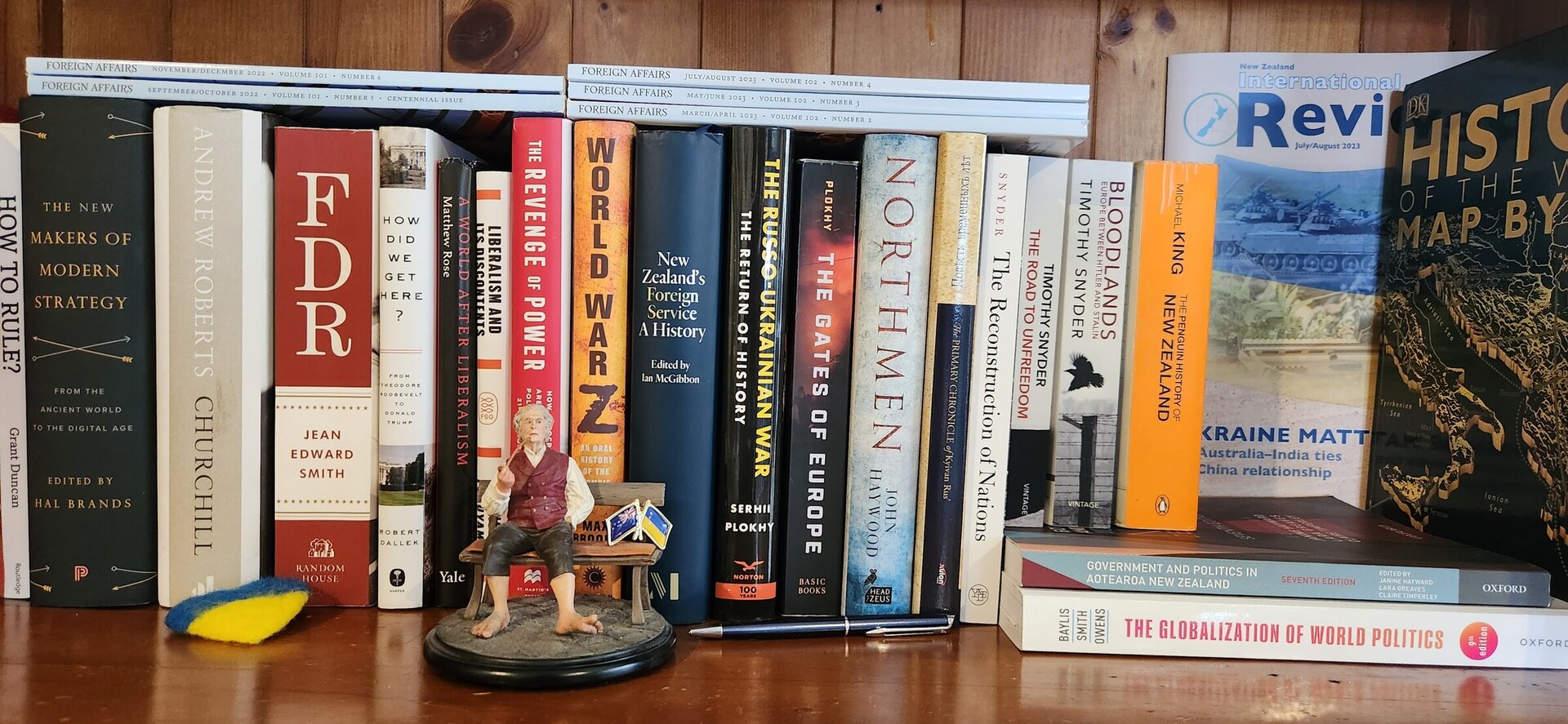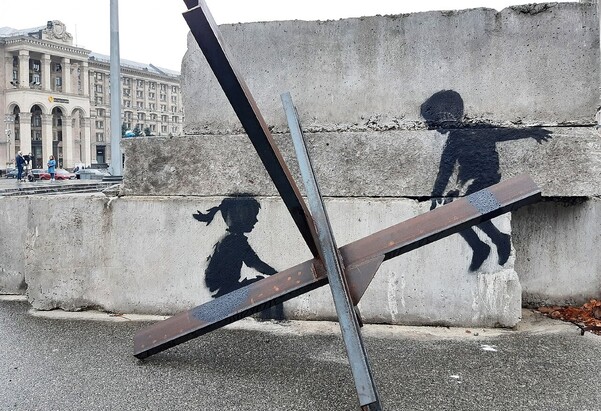Watching the Russian-Ukrainian war unfold from New Zealand
Article by Veronika Orekhivska
This article first appeared on the Craccum, published by the University of Auckland
“It Feels A Shame To Be Alive” — Emily Dickinson.
I would never have thought that the line Emily Dickinson wrote almost 160 years ago would turn into a feeling that burns from the inside of me and all Ukrainians who are not in Ukraine right now. We are all as one paralysed by fear, pain, and grief. But my brothers and sisters in Ukraine are forced to act without breaks for sleep or food because the desire to survive and stay alive drowns out all other feelings.
I confess that I do not know how much time has passed since the first bombs fell on Ukrainian cities. It feels like we have been in this for months. But according to my messages to my friends, it is clear that this happened only a few days ago, on February 24th at 6pm NZT. It was 4am in Ukraine. It was also dawn when Germany invaded Poland in 1939.
It started almost a 1000 years ago
For Ukraine it didn’t start on February 25. It didn’t start a few weeks ago when the governments of New Zealand, U.S., and other countries asked their citizens to urgently leave Ukraine. It didn’t start in 2014, when Russian troops invaded Ukraine for the first time in modern history. News outlets around the world avoided calling it a war, overusing words like “crisis” and “conflict”. They still do. It didn’t even start in 1991 when Ukraine left the Soviet Union and declared itself an independent country.
It will be a shock to find out (it’s a shock to me every time I think about it) but for Ukraine it all started hundreds of years ago. Russia has invaded Ukraine roughly every century since 1149. Ukraine has never invaded Russia. Throughout all these years, Russia (and our other neighbours) have owned bits and pieces of our country from time to time. In the early 1900s, Ukraine became independent for a second, but then the Russian revolution came and brought Ukraine into the Soviet Union. For 70 years, the Ukrainian people were equated to the Russians. They devalued our culture, and persecuted and killed those who spoke out against the Soviet regime. But despite the decades of this humiliation, the Ukrainian language did not disappear. Ukrainian culture flourished because the stories and songs of our ancestors are passed down from generation to generation. In the late 80s the Soviet Union began to disintegrate; my country saw this as an opportunity and in 1991 Ukraine declared its independence. But the pro-Russian forces did not even think of leaving the Ukrainian government, and we knew it, we saw it, we felt it. So, there was a (nearly peaceful) revolution in 2004 that opposed the pro-Russian government and the protests were successful.
And then in 2013-14 there was the Revolution of Dignity that overthrew the pro-Russian president and the whole country thought that Russian influence would end there. Yes, I’m in my early 20s and I’ve already witnessed two revolutions in my home country. In 2014, the Russian army invaded the territory of Ukraine. Russia justified their actions with the help of deception, misinformation, and sabotage. News publications and political scientists around the world can provide 100 reasons why this happened, 100 reasons that led to this, but as a Ukrainian I believe that when we overthrew the pro-Russian president, the Russian government realised they were losing control over us and sent their troops. And so they remain in Ukraine to this day.
Why did they start hostilities and what do they need from Ukraine? To put it simply, Ukraine has set an example of democracy and independence. Ukraine has shown that it is ready to live on its own without the influence of the Russian authorities, and this is very dangerous. Because after Ukraine, other countries that were under the rule of the Soviet Union can rise up and this will be a big blow to the authority of the Russian government. My people haven’t taken a deep breath since 2014.
“Oh no, it’s a war. I just bought my gym membership”
This is a message from a close friend of mine as soon as active hostilities began yesterday. She could joke then, but a day later, I heard her crying in the audio messages, unable to say a word. My aunt had to go to work. Employers threatened to fire her if she didn’t do so, and she can’t afford to lose her job even at a time like this. My classmates are in bomb shelters. Sometimes they go home (if they still have a home) to eat. And they eat like it will be the last time because they don’t know when they will have the opportunity to eat again. My 14-year-old cousin knows now how to seal windows so they don’t shatter from the vibrations of the exploding bombs. Nurses carry newborn babies into the basements. Children and women hide at metro stations—a few days ago, a child was born there. My mother’s godson signed up to be a volunteer fighter. My grandparents, who cried for five years that I left Ukraine, are now crying with happiness that I am not there.
I and my close family in New Zealand seem to have aged a few decades in these couple of days. My body refuses to function normally. None of us can let go of the phone. We text every few hours to each of our relatives, but every time we hear a phone buzz our hearts stop. We no longer have conversations, we just wait for the two words: “I’m alive”. We don’t tell them how we’re doing because nothing in the world seems important enough to share with people who are at war. I do not know how to answer when they tell me that they are ready to die and that they are not afraid of death. And my biggest fear right now is that one of them will die and I won’t know about it. Because who else will tell me about it?
It’s not a crisis. It’s not a conflict. It’s a war.
“As Russia continues to wage war in Ukraine, the fighting has not been as one-sided as might have been expected. Despite being outgunned and outnumbered, Ukraine inflicted more casualties in 24 hours than Russia suffered over eight years of engagements in Syria.” —The Economist 1
More than a week ago, the Ministry of Telecom and Mass Communications of the Russian Federation ordered the Russian media not to call what is happening a war.2
Russian propaganda is strong, and all those terrible stories that we see in films and TV shows about harmful disinformation are true. A small group of Russian activists around the world are raising funds to sponsor independent news outlets to tell the truth in Russian for Russian citizens. I never would have thought that during the war one of the most terrible weapons would be information. But it also means that you and I can help.
Share and repost, and spread awareness. I know that this phrase has become overused lately, but in the 21st century information diverges quicker than before and it might help. It is very easy to believe that we are helpless, but we are not as long as we have the opportunity to spread truthful information. Check the sources from which you draw information and share it with everyone, especially with your colleagues/friends from Russia.
Sign petitions, donate, and did I say donate? Signing petitions online can feel unreliable. But it is quick and easy, and in this way you can help, but also show everyone how many of us are. Here are links https://linktr.ee/RazomForUkraine and https://linktr.ee/UkraineResources where you can find all the necessary resources as well as links to donations that go directly to support the army or support civilians. Any active action to stop this war is another breath for my family and my friends.
We hope for a miracle. And the past few days have shown that miracles are possible: a car with a civilian was run over by a Russian tank. Twice. The man inside the car is still alive. We hope for the miracle that Ukrainian forces will push Russian troops back to Russia. But we fear that Ukraine is not strong enough, and that the Russian government will take at least the eastern part of Ukraine. We fear that if Ukraine ceases to exist, Russian forces will turn their attention to Europe and continue to attack whomever they want.
But with your help, that may never happen. I wish you a peaceful sky above your head.
Slava Ukraini!—Glory to Ukraine!
Notes:
1 The Economist, 25.02.22, “The military gap between Russia and Ukraine is vast”.
2 эхо кавказа, 26.02.22, “Роскомнадзор требует от СМИ не называть происходящее на Украине войной”/ “Roskomnadzor demands from the media not to call what is happening in Ukraine a war”.
Image: Bansky' mural "Solidarity with Ukraine' at the Independence Square (Maidan Nezalezhnosti), Kyiv, Ukraine. Source: Wikipedia


